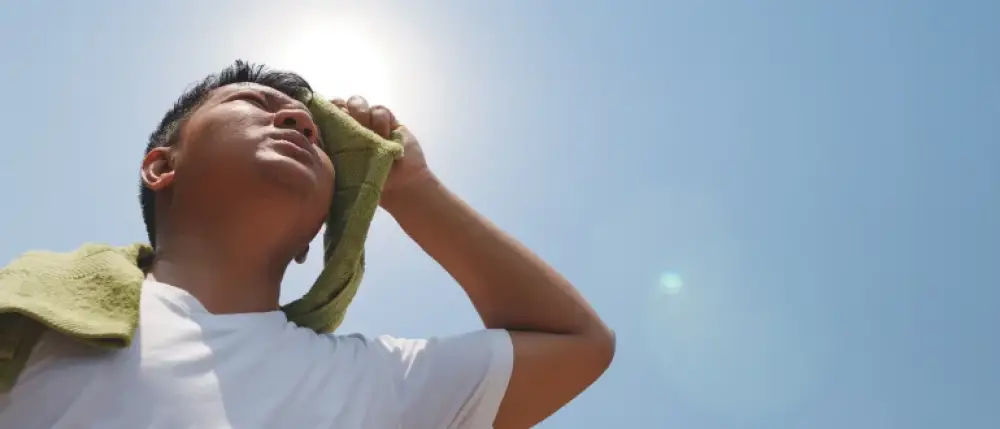Subscribe to get weekly insights
Always stay up to date with our newest articles sent direct to your inbox
Published on 21 Sep, 2023
Updated on 20 Mar, 2025
5060 Views
4 min Read

Written by Care Health Insurance
0Like
Be the First to Like
Did you know prolonged exposure to intense heat and humidity can place undue stress on the body and potentially lead to heat-related illnesses?
Yes, you heard that right!
One such condition is heat exhaustion, which occurs when the body becomes overwhelmed by heat and is no longer able to cool itself.
Heat exhaustion develops when a person's body works hard to cool the core temperature through sweating but struggles to keep up. Common symptoms of body heat include heavy sweating, weakness, dizziness, nausea, vomiting and a fast pulse. It represents the body's response to overheating and inability to regulate its internal thermostat. While not life-threatening, heat exhaustion can progress to heatstroke without intervention and care. Read on as we discuss the symptoms, causes, treatment and prevention of heat exhaustion here.
Some common signs that the body may be suffering from heat exhaustion include:
If you experience heat exhaustion symptoms, moving to a cooler environment is necessary as treat heat exhaustion. Seeking air-conditioned shelter is ideal, but at a minimum, find relief in the shade away from direct sunlight.
Some additional recommended approaches include:
Improvement should occur within 15 minutes. However, if symptoms fail to adequately subside, it is advised to visit a doctor immediately for heat exhaustion treatment, as heat exhaustion can potentially progress to a more severe heat stroke without proper resolution.
Under normal circumstances, the body has an effective natural cooling mechanism where sweat evaporates off the skin's surface, helping to regulate one's internal temperature. However, during times of elevated physical exertion, particularly in hot and humid weather conditions, maintaining the optimal core temperature can become increasingly challenging.
Heat exhaustion occurs when the body is no longer able to dissipate enough heat to keep itself from rising to an unhealthily high degree. Strenuous activity often results in considerable fluid and electrolyte loss through perspiration. Electrolytes like sodium and potassium play a key role in ensuring various bodily processes function smoothly.
If one's fluids and electrolytes drop to deficient levels due to inadequate rehydration and replenishment, dehydration can set in. As water and minerals are crucial for metabolism and thermoregulation, dehydration makes it more difficult for the body to manage heat efficiently. As a result, there is an elevated risk of temperature deregulation, leading to a heat-related illness such as heat exhaustion.
When body temperature rises to an extreme level, it leads to heat exhaustion, and if it is left untreated, heat exhaustion may progress to heatstroke. Notably, heat exhaustion and heatstroke can impart dangerous impacts like impaired thinking, disorientation, or even loss of consciousness. During heat exhaustion, one is typically still mentally aware as the internal temperature remains under 103°F.
While less prevalent than heat exhaustion, heatstroke introduces significant risks by placing an increased burden on crucial organs like the heart, lungs, kidneys and liver.
A person's risk of experiencing heat-related illness is closely tied to the heat index, a measurement combining temperature and humidity levels into a single value representing how hot conditions feel. When relative humidity exceeds 60%, sweating becomes less effective at cooling the body through evaporation.
The probability of issues arising grows substantially once the heat index reaches or surpasses 90 degrees Fahrenheit. It is wise to pay close attention to reported heat index values, especially during prolonged heat waves, as direct sunlight can further elevate perceived temperatures.
Other than this, certain people are particularly vulnerable to heat exhaustion, depending on:
Here are a few tips you can follow to avoid heat exhaustion:
While hot summer weather presents risks, vigilance and proper care like remaining hydrated, limiting direct sun exposure when possible, dressing appropriately and being mindful of individual risk profiles go a long way in avoiding and recovering well from heat exhaustion and heatstroke.
By recognising early signs of heat exhaustion and promptly implementing cooling measures, serious deterioration into heatstroke can typically be averted. If the condition seriously worsens, hospitalisation might be necessary. Even a few days in the hospital can eat up your savings. That’s why having health insurance is essential for everyone, especially today when healthcare costs are at an all-time high. If you too are looking for one to cover your family, let our experts guide you through finding the right policy from Care Health Insurance.
>> Also Read: How to Reduce Body Heat & Stay Cool in Summer
Disclaimers:
The above information is for reference purposes only: Policy Assurance and Claims at the underwriter's discretion.
All plan features, benefits, coverage, and claims underwriting are subject to policy terms and conditions. Kindly refer to the brochure, sales prospectus, and policy documents carefully.
Be the First to Like
शुगर कंट्रोल कैसे करे? जानें, डायबिटीज में क्या खाना चाहिए Care Health Insurance in Health & Wellness
Thyroid : मामूली नहीं हैं महिलाओं में थायराइड होना, जानें इसके लक्षण और घरेलू उपचार Care Health Insurance in Diseases
हाई ब्लड प्रेशर को तुरंत कंट्रोल कैसे करें? देखें इसके उपाय Care Health Insurance in Diseases
प्लेटलेट्स की कमी के लक्षण, कारण और इलाज क्या है Care Health Insurance in Diseases
Healing From Postpartum Sleep Issues: Tips & Self-Care Solutions Care Health Insurance in Mental Health
What is Endocrinology? Hormones, Disorders & Treatment Care Health Insurance in Diseases
प्रेगनेंसी ब्लड टेस्ट कब करना चाहिए? देखें, प्रेगनेंसी ब्लड टेस्ट नाम Care Health Insurance in Maternity
काली मिर्च के फायदे और नुकसान क्या है? Care Health Insurance in Health & Wellness